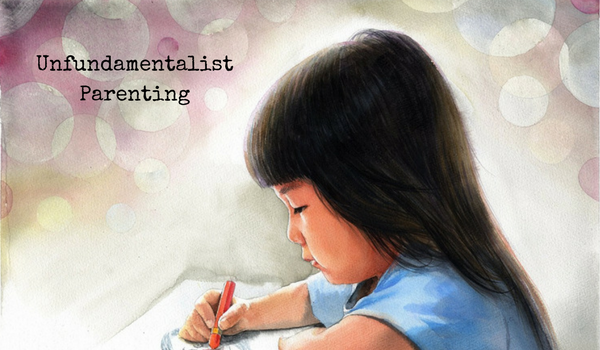
Image: Pixabay
Deconstructing can be emotionally, spiritually and intellectually draining. Add that into the work of parenting and all of those emotions can be quadrupled. In addition to dealing with their own spiritual “stuff,” parents are worried about how their faith changes will affect their children. They’re concerned about providing some kind of spiritual consistency even while recognizing that they may be making a change in their children’s religious upbringing.
Here are 5 ideas for parenting faithfully even in the midst of a personal faith shift.
1. Focus on the stories
Sometimes, parents who have been wounded by religion shy away from scripture. With Bible passages being misused, proof-texted and misquoted, it’s no wonder that people find it triggering to read. At a tough point in my own faith journey, I discovered that reading the Bible caused something similar to a low-grade panic attack. I couldn’t make sense of any of it, how was I supposed to take wisdom from it?
Still, throwing out the stories of our faith is like throwing the proverbial baby out with the bathwater. If the Bible itself is too triggering (all those memories of being forced to “believe” each story!) find a good storybook Bible. (I’m a big fan of the Children of God Storybook by Desmond Tutu.) Then, do your best to just enjoy the stories themselves without plumbing them for a secret agenda. By continuing to engage with Christian community this way, you lay the groundwork for your kids to continue in their own faith journey, even while you’re in the midst of some hard spiritual work.
2. Teach Theological Wondering
Several Christian curriculums, including “Godly Play” and “Worship and Wonder,” use a beautiful technique for doing theology with kids. Rather than asking children questions designed to lead them to a correct answer, these methods prompt inquiry by using questions beginning with I wonder.” “I wonder what you think of this story.” “I wonder what part is your favorite.” “I wonder what this story teaches us about God.”
For a deconstructing parent, this technique is a breath of fresh air. You’re not expected to have all the answers. Instead, you take on the role of a spiritual guide for your children rather than spiritual authoritarian.
3. Help Kids Explore Their Own Questions
Perhaps one of the hardest elements of parenting while deconstructing is that we no longer have all the answers to our children’s questions. “Why did Jesus die?” “Did Jesus really walk on water?” “Were there any women among the disciples?” In the midst of serious, sincere questions, it’s hard on a parent’s heart to keep saying “I don’t know.” While there’s nothing particularly wrong with that answer, repeating it time and time again becomes discouraging. More heartbreakingly, it reminds us that we used to know. We used to have all the answers—and parenting was much simpler then. The good news is that these questions are another opportunity to guide children in their own thinking. Instead of feeling guilty for not having all the answers, embrace the opportunity to help children explore. Try responding with “Interesting question! I wonder what you think about that.” Kids are often more willing to engage in dialogue than we think. Sometimes, what sounds like a simple yes or no question is actually their invitation to us to join them in exploring.
4. Do acts of service
The majority of religious traditions, plus humanist philosophies and many cultures value acts of service. Sometimes, when our faith doesn’t make sense in our heads, it makes sense in our hearts. So while I think it’s always important to volunteer our time to help others, it’s particularly important when we’re in the midst of a faith crisis. The simple act of helping another can be a balm for a weary soul. It’s also a critical foundation to lay for children. Like engaging with the Bible stories, engaging in acts of charity is one way to maintain the faith even if you’re not sure what “faith” looks like for you.
5. Pray the psalms
Deconstructing is hard because it’s both a spiritual endeavor and an intellectual one. When we question everything we thought we knew about God, we can find ourselves feeling two very intense things:
- Spiritually disconnected
- Deeply confused
During my own time of spiritual questioning, I found myself consumed by a search for information that would make sense to me. I read theology and biblical interpretation voraciously. I could not stop. At the same time, I knew that I was taking in more intellectually than I could make sense of spiritually. I needed to balance all of the heady thinking with time in prayer. The catch being that I couldn’t pray well because I didn’t understand the One I was trying to be in relationship with. As I’ve heard others describe their journeys, I know I’m not alone in this. So, I’m going to offer the advice I wish I’d been given: pray the psalms.
The beauty of the psalms is that they are traditional and keep us anchored in the faith (see point 1.) And yet, they speak directly to the struggle of faith and doubt. Taken as a whole, the book of Psalms presents us with a variety of theologies and viewpoints that can give us intellectual meat for our spiritual search. This passionate biblical witness of a faithful struggle means that parents in spiritual questioning can pray without fear of indoctrinating children in a tradition they are questioning while still being fed in prayer themselves.
Parenting faithfully in the midst of religious change can be a challenge. The pressure of wanting to “figure it all out” in order to guide the little people in our families can be intense. While there’s no way to move through a phase of spiritual questioning faster or easier, these suggestions might help ease the burden of providing spiritual guidance for your children while in the midst of questioning.
Amelia Richardson Dress is a writer, minister and mom who’s passionate about faith and justice. She refuels for all of this with plenty of tea and time in the garden. Amelia blogs at barefootfamily.me, keeps her professional writing clips at ameliadress.com and can be found on Twitter and Facebook.












